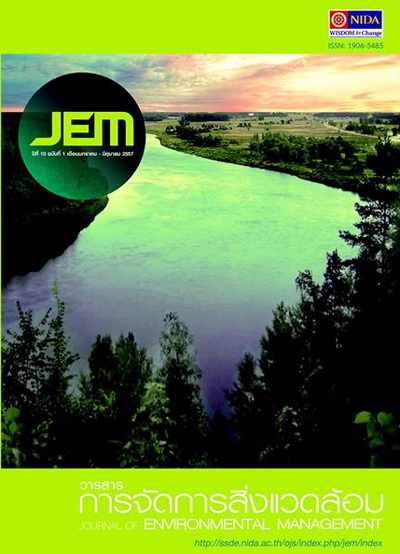การบริหารจัดการน้ำแบบมีส่วนร่วม เพื่อรับมือการเปลี่ยนแปลงภูมิอากาศ กรณีศึกษาเทศบาลตำบลคูเต่า อำเภอหาดใหญ่ จังหวัดสงขลา Participatory Water Management to Cope with Climate Change: A Case Study of Kutao District Municipality, Hatyai, Songkhla
บทคัดย่อ
บทคัดย่อ
การศึกษาครั้งนี้มีวัตถุประสงค์เพื่อ 1) วิเคราะห์ผลการศึกษาสถานการณ์ปัญหาจากการเปลี่ยนแปลงสภาพภูมิอากาศของประชาชนในชุมชนเทศบาลตำบลคูเต่า 2) ศึกษาการพัฒนากระบวนการนโยบายสาธารณะอย่างมีส่วนร่วมในการบริหารจัดการน้ำเพื่อรับมือการเปลี่ยนแปลงสภาพภูมิอากาศ วิธีการศึกษา ใช้การถอดบทเรียนจากการวิจัยเชิงปฎิบัติการแบบมีส่วนร่วม ผ่านวิทยานิพนธ์ “การพัฒนากระบวนการนโยบายสาธารณะแบบมีส่วนร่วมเพื่อรับมือการเปลี่ยนแปลงภูมิอากาศ กรณีศึกษา พื้นที่เทศบาลตำบลคูเต่า อำเภอหาดใหญ่ จังหวัดสงขลา” ที่ผู้เขียนได้วิจัยร่วมกับชุมชน ผลการศึกษาพบว่าปัญหาการเปลี่ยนแปลงสภาพภูมิอากาศ ได้แก่ เกิดอุทกภัยและวาตภัย เฉลี่ย 1-2 ครั้งต่อปีในรอบ 30 ปี โดยมีพื้นที่เสี่ยงภัยที่สุดได้แก่ หมู่ 1, 2, 3, 5 และ6 และกระบวนการนโยบายสาธารณะอย่างมีส่วนร่วมในการบริหารจัดการน้ำเพื่อการรับมือการเปลี่ยนแปลงสภาพภูมิอากาศ ควรให้ความสำคัญกับการเสริมอำนาจให้กับสถาบันของท้องถิ่น การปรับตัวต่อการเปลี่ยนแปลงภูมิอากาศเป็นเรื่องจำเพาะของแต่ละพื้นที่ดังกรณีศึกษาตำบลคูเต่า เช่นยุทธศาสตร์การบริหารจัดการน้ำเพื่อลดผลกระทบในพื้นที่เสี่ยงภัย ซึ่งมีการพัฒนาระบบการเตือนภัยอุทกภัยโดยองค์กรชุมชนแสดงบทบาทร่วมกับองค์กรปกครองส่วนท้องถิ่น ส่วนท้องที่ และผู้นำศาสนา มีการวิเคราะห์ปัจจัยที่เกี่ยวข้อง ร่วมกำหนดแนวทางเตือนภัยระดับชุมชน การพัฒนากลไกเฝ้าระวังและประเมินสถานการณ์ และผนวกเข้าเป็นส่วนหนึ่งในแผนการพัฒนาท้องถิ่น และพบว่า ปัจจัยสนับสนุนที่สำคัญ ได้แก่ กลไกประสานงานกลาง การบริหารจัดการอย่างมีธรรมาภิบาล การกำหนดขั้นตอนและวิธีการอย่างมีส่วนร่วมและยืดหยุ่น การเข้าถึงข้อมูลและความรู้ และการสื่อสารทั้งรูปแบบเป็นทางการและไม่เป็นทางการ
คำสำคัญ: นโยบายสาธารณะ; การเปลี่ยนแปลงของสภาพภูมิอากาศ; คุณภาพชีวิต
Abstract
The purposes of the study were as follows: 1) to study the problems caused by climate change that affects the life quality of the people in Kutao municipality; and 2) to study the development of the process of public policy regarding participation in water management in order to cope with climate change. The research was conducted by synthesizing participatory action research via a thesis entitled “The Development of a participatory public policy process to cope with climate change: a case study of Kutao Municipality, Hatyai, Songkhla” for which the author had done research with the community. The results indicated that the problems of climate were floods and storms, at an average of 1-2 times annually in 30 years. The areas subject to the most risk were Moo 1, 2, 3, 5 and 6. The process of public policy regarding participation in water management in order to cope with climate change should pay attention to the empowerment of local institutions. The adaptation to climate change was specific to particular areas, as in the case study of Kutao district. The strategy of water management was implemented to minimize the impacts in areas of risk and a flood warning system was developed. Community organizations participated with local administrative organizations and religious leaders to determine warning methods at the community level, to develop an alert mechanism, to assess the situation, and finally to integrate everything in the scheme of local development. It was found that there were supporting factors, such as a mechanism for center cooperation, management with good governance, determination of the steps and methods with participation and flexibility, access to data and knowledge, and formal and informal communication.
Keywords: Public policy; Climate change; Quality of Life



